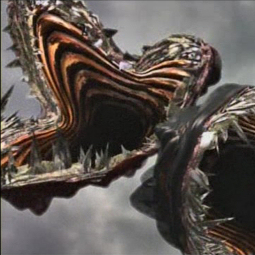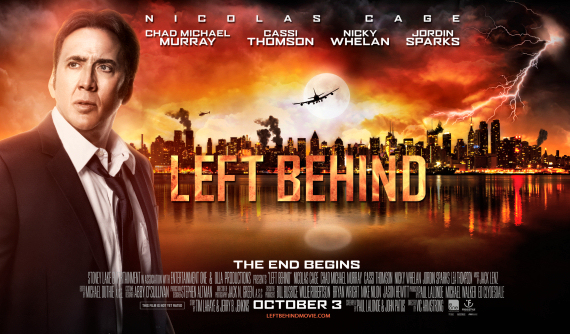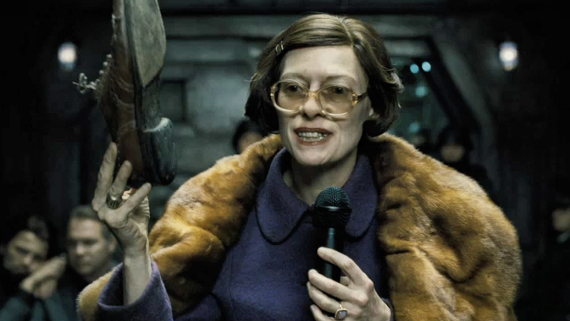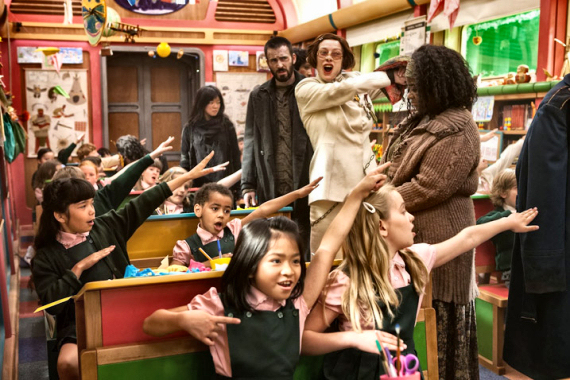
Having enjoyed a badly-done TV-movie version of Stephen King’s The Langoliers (yes, sometimes I do like really badly done movies. What can I say: I’m weird!), I thought that maybe a different (religious) take on lots of people disappearing from an airplane might be kind of fun. *WARNING*–if you believe in The Rapture, please skip this review entirely!
Since I’m not religious, I’ve never read Jenkins & LaHaye’s Left Behind, but I was aware that it involved “The Rapture,” when supposedly God—we’re speaking about a specific American Christian God here—will take all the “worthy” people up to Heaven—or to meet Jesus “in the air” (depending on your version)—instantly, leaving the rest of us (yes, I’m sure that if such a thing were to happen, I’d be Left Behind) to “seven years of Tribulation,” (all of that being part of the End Times which leads to the End of the World. (I’m also vaguely aware that these kinds of Rapturists appear to be fond of Capitalized Words.) (By the way, if you happen to believe in the Rapture, I apologize for my lack of belief; but that’s just me.) Boy, did I get a wrong number!
In all three films, well-known (and in at least a couple of cases, extremely well-respected) actors have starring or co-starring roles), leading me to file all three under the Department of What Were They Thinking? heading. These movies will not advance their careers one whit, and may actually prove detrimental. I will provide capsule and spoiler reviews for all three: Left Behind, Snowpiercer and Last Knights.
Capsule Review of Left Behind (2014): If you don’t know in advance that this is a religious movie, you may think it’s another sf/action/adventure movie with Nicholas Cage playing Rayford Steele, a commercial pilot. Oh, look, you might think, there’s also Lea Thompson (the Back to the Future series) and Jordin Sparks (American Idol), so this should be pretty good, eh? Well, nothing really happens except for a tiny bit of character development (Nick Cage, pilot, probably cheating on his wife, Leah Thompson, too sickly-sweet to be believed because she Loves Jesus; Cassi Thomson—TV actress I hadn’t previously seen—as their daughter, Chloe, college student and PITA, just in the first half-hour; and Chad Michael Murray, from Chosen, and Agent Carter, as Buck, a TV “investigative reporter” whom everyone apparently knows and loves), and a slow setup that doesn’t really develop any of the dozen or so secondary or tertiary characters, but that thickens their cardboard lives just a bit: there’s the scientist, the angry dwarf (!), the pro footballer’s wife, the old couple with a touch of Alzheimer’s, etc. Then (minor spoiler here, but this is the crux of the whole movie) a bunch of people disappear and the movie starts in earnest. For the next couple of hours we see little snippets of things happening in the New York area—mostly on TV news—that tell us that Things Are Really Bad on the ground, and a whole lot of jabber and stuff on the plane that tells us Things Are REALLY Bad on the Plane. Except that only a few scenes on the plane involve conflict of any kind. Most of the movie—until the last half-hour or so, is talk, talk, talk. Frankly, it’s boring, badly written, and badly acted. Even if you believe in The Rapture, don’t waste your time.

SPOILER REVIEW of Left Behind: Okay, this movie telegraphs all its punches. We find out quickly that Cage is a cheater (“I never wear my wedding ring when I’m flying.”), his wife is big on Jesus and religion, Chloe is anti-religion (she has an argument with a religious person at the airport who’s haranguing Buck before he boards Steele’s plane. Chloe, a college student, has come home for her father’s birthday, only to find that he’s been “called in to work,” and is flying to London. She sees him with an attractive blonde flight attendant and notices he’s not wearing his ring; putting it all together she realizes he’s not exactly a model husband and father. She meets Buck and they form an instant bond, which is silly, because they don’t meet again until nearly the very end of the movie. We get to meet her mother (Thompson) and her geeky 14-year-old kid brother just so we’ll know what a Jesus freak (I’m using that phrase advisedly) her ma is; we also get to know a bit about the rest of the passengers, which is silly, because they hardly figure at all in the resolution of the picture and are there only to riot when the disappearance happens. All the acting in the characters’ introductions and interactions is poor, but they had little to work with, script-wise. Then, three hours into the flight, a bunch of people, mainly children and the elderly, vanish. Oh, yeah, the co-pilot and “Missy,” a flight attendant, also disappear, and Steele/Cage figures out by looking at his co-pilot’s watch, which says “John 3:13” (I think, I’m not familiar with that particular book of the Bible) and the cross around the neck of the missing attendant—plus his own wife’s obsession with Jesus—that the Rapture has happened. But it takes him a while. So after some time, he decides that since they’re not actually half-way to London yet, he should turn back. Besides, he can’t get anyone on the radio and there’s no satellite phone service either. (The capsule introductions show us why some of these people don’t disappear: one’s a Muslim, one’s a scientist—no science in heaven!—and the others are argumentative, gamblers and… have Alzheimers? The old lady stays while her husband disappears. I don’t get it.)

Meanwhile, back in the NY area, Chloe has had an argument with her mother and taken her kid brother to the mall, where they are when “millions of people, all around the world,” vanish. Immediately, because that’s how people roll in New York, I guess, there’s a riot; people start stealing stuff—not only from the purses and wallets of the vanished, but also from stores. The streets immediately become clogged with cars and fights between drivers and, according to the TV news, stuff starts blowing up all over the world. (Dunno why, no explanation given.) Chloe heads to the parking lot but, before she can get into her car a small plane (Cessna or other) without a pilot crashes into her car and bursts into flame. She runs frantically all over town and to hospitals looking for her brother, who’s disappeared, and goes home to find her mother gone too. Back in the plane, Cage is alerted by an alarm that there’s another plane headed right at him; nobody’s responding on the radio. He then broadcasts that he’s climbing 1000 feet—that’s “one zero zero zero feet” and begins his climb… too late! as the other plane’s wing or tail clips the starboard wing, damaging the flaps and holing the starboard-side fuel tank. The plane begins losing fuel, which then bursts into flame—but it’s okay; they’re staying ahead of the flame and it will eventually burn itself out when it runs out of gas. And since he knows that the End Times are here, he’s also turning back towards his family and away from the attendant he was planning to sleep with in London. All this is told in excruciatingly tedious detail. There’s a minor incident aboard when the football player’s wife, who has stolen the gun of the missing sky marshal (they telegraphed this at least three or four times, although I thought the dwarf was gonna steal it) and accused her husband of stealing her baby and paying everyone off to come up with this story about people vanishing. But Buck talks her down. Everybody goes back to wondering “Wha’ hoppen?”
Eventually, Steele gets a contact with his daughter via satphone; the tower finally answers, and he finds out that all the NY runways—LaGuardia and so on—are “full of birds” and there’s nobody to clear them. Steele is “running on fumes,” but fortunately, the satphone conveniently gets hold of Chloe who says she can help. Chloe picks up a big motorcycle and, without goggles or helmet makes her way to a nearby road construction site (they’ve telegraphed this one too) that will serve as a runway; she manages to light some big barrels of fuel to serve as a runway marker, the plane loses the port landing gear on some wires, but Steele brings the big bird in on its belly, stopping less than a foot from a fuel tanker he was about to hit. (“How conveenient,” I hear Dana Carvey’s Church Lady say.) And after all get off the plane via the emergency chute Steele embraces his daughter and tells the horny attendant to get lost. Movie over… just sort of ended. We don’t know anything about the seven years that are supposed to follow. We’re just dropped. Ugh. Terrible movie. *SPOILER ENDS*

CAPSULE REVIEW of Snow Piercer: A thing about SF movies, is that they try to get the science right, and they also try to put it in a reasonable timeframe; if it’s supposed to be the future, they attempt to make it a future that could happen without distorting the past as it is. Otherwise, it is, as Steve Davidson says, Science Fantasy, not SF. We’re told at the beginning of Snow Piercer that in 2014, most of the world’s nations accepted climate change as a reality and, as a consequence, 79 of them banded together to do something about it. Okay, reality check—given that the movie actually came out in 2013—can you see 79 nations agreeing on ANYTHING? Let alone climate change, in less than a year of the movie’s emergence; anyway, a chemical called CW-7, or CV-7 or something like that, untested, is put into the upper atmosphere by these nations, and it is supposed to “bring the runaway temperature of the globe back to normal,” or words to that effect. Instead, it (and this is a semi-quote, as I can’t recall the exact words) “it froze the world and all life became extinct except for the small portion of humanity that was on the train.” Excuse the freak out of me? Is that scientifically possible? To freeze the world just like that? And all life going extinct? Are all the oceans frozen too? Because to freeze the oceans and all ocean-going life, would be one hell of a task, given that salt lowers the freezing temperature of water. But anyway, it did in the movie—taking it immediately into the realm of Science Fantasy, in my opinion.
So Wilford (Ed Harris (Apollo 13, Needful Things, Appaloosa, etc.)), the guy who basically bought out the world’s railroads and connected them together, saw this coming, and built a train that could survive the freezing. On it he sold tickets for first-class and second-class passengers, then had a number of cars that he let freeloaders into. The only way the train stays alive is to circle the frozen world, once a year. And they’ve been doing this for 17 years; the date is now 2031. But the passengers lord it over the “last cars,” and the people in the last cars are made to survive on nutrient bricks that look as appetizing as gelled grease. And their children are taken away at regular intervals. And they are brutalized by the crew and the Minister, Mason, played by Tilda Swinton (Narnia, Only Lovers Left Alive, etc.)—one of the best actresses alive, in my opinion. A revolt is brewing, led by Curtis (Chris Evans (Captain America, The Avengers, etc.), who is advised by Gilliam (John Hurt—Alien, Indiana Jones and the Kingdom of the Crystal Skull, too many others to name), to take over the front of the train where Wilford and the passengers are. Mason, played brilliantly by Swinton in bad “English teeth” and a working-class accent, together with her soldiers and bully-boys, guards the “sacred engine” and keeps everyone in their “ordained place”; she explains that for a “last-car” person to not stay in his/her ordained place (“Know your place!”) would be like wearing a shoe for a hat.
And since the premise was unbelievable, and the characters—except for Mason—mere stereotypes (this includes Wilford and Curtis and Gilliam), this movie offers nothing to the SF fan—not even a whole bunch of “frozen world” SFX, as the ones that do happen happen well after halfway. From here on in, too many unbelievable things happen, and had I not been watching this for review, I would have probably dropped out half-way.

SPOILER REVIEW of Snow Piercer: Mason’s bully boys take away some of the children, including Tanya’s (Octavia Spencer) son Tim; Curtis promises to find the children and bring them back after taking over the train. Gilliam notices that the soldiers accompanying Mason are probably out of bullets; at one point Mason tells the soldiers to “put away those useless guns” and, since they’ve been on the train for 17 years, “useless” probably means bulletless. So Curtis and crew go up against soldiers and hooded men carrying hatchets, knives and machetes, etc., armed only with homegrown weapons made from brooms, etc. Of course, numbers are on their side and they prevail, making their way up the train. As they go, they pass through sleeping compartments, school compartments (Figure 6), “ocean compartments” complete with schools of fish and manta rays(!) and even meat lockers with hanging beef halves and lots of frozen chickens. They also learn that the nutrient bricks are made from… grasshoppers or locusts, I think. You get two quick glimpses into a hopper where these bugs are churned and processed. Are you following me so far? If all life is extinct except on the train, is there a car full of grasshoppers? Or cows? What do they eat? How big is the car with the salt-water aquarium? How many cars are there?

They make their way up to the prison cars, where Nam Minsoon (Kang-ho Song) and his daughter are kept in drawers (asleep, I’m guessing) because Nam’s the only one who can open the sealed compartments. He’s addicted to an hallucinatory drug called “Kronole.”He speaks no English (he has a handy-dandy pocket interpreter with voice-recognition), and his daughter can tell what’s in the next car through either some kind of psychic revelation or really good hearing. They take Mason prisoner and eventually find out that Nam was hoarding Kronole because it’s an explosive. (Yes, it’s two! Two! Two things in one!)
Eventually they reach the front of the train and confront Wilford, who explains to Curtis that the train is a “closed eco-system” and the occasional riots and so on are necessary to maintain the numbers, as the unruly “last car” folks tend to breed uncontrollably. (The little children are taken away to be put in the engine and left there as oilers and maintainers until they get too big; then they’re disposed of.) Mason dies before they get to the front of the train. Gilliam (remember John Hurt?) was Wilford’s agent, but since he lost control he has to pay the price, and is put to death, with Curtis as his replacement. Curtis refuses, Nam makes sure that the train gets blowed up real good, as they used to say on SCTV, and Wilford too bites the dust… er, the ice. Nam and his daughter exit the train and see a polar bear… and we can probably be forgiven for thinking the polar bear is saying “Hey! Lunch is delivered!” We have no idea what happens to Curtis or the rest of the train after that.
None—and I mean none—of this movie made sense to me. Obviously metal gets brittle in deep cold; who maintains the bridges and rails? What do they feed the chickens, cows, fish, grasshoppers? And so on… I have since, however, come to know that it’s from a comic book, so that’s probably why… comics are allowed to play more “fast and loose” with reality than SF books or movies. Unless you’re a fan of the comic, I think you should give this one a pass… it’s full of gratuitous violence and very little sense. *END OF SPOILER*

CAPSULE REVIEW of Last Knights: In some kind of pseudo-medieval mashup land, where nothing makes any sense, Morgan Freeman (as Bartok) is Lord of the land and castle his family has occupied for generation; unfortunately, his son has been killed some time ago and he has no heir save a daughter. Clive Owen is Raiden, commander of Bartok’s knights (7th rank); all the knights live by an unbreakable code and are loyal to the last drop of blood in their veins. Bartok runs afoul of the Emperor’s (Peyman Moaadi) First Minister, name of Gezza Mott (played by Norwegian actor Aksel Hennie), who is as corrupt and greedy as they come. Bartok refuses to bribe Mott, who promises that he will wipe the Bartok name and clan off the map and throw them off their lands. Mott takes Bartok to the Emperor, who says that this insubordination can either end with all the Bartoks being beheaded or just Morgan Freeman; Freeman accepts the blame and makes Raiden—as his loyal Commander—kill him. Raiden returns to his pre-Bartok life as a drunkard and gambler, although Mott is sure he wants vengeance. The remainin Bartoks are turned out of their castle, which is burned, and the Bartok land parceled out to the rest of the nobles. You can guess the rest. It’s all pretty predictable.
SPOILER REVIEW of Last Knights: A number of people have commented that this resembles 47 Ronin; the concepts of knights (samurai) the Code of Honour (bushido) and the Emperor and his venal Minister (pretty much the same) are nearly identical. Yes, this movie borrows from that sort of samurai movie; the plot is fairly common to many of that type. My main complaint is not the plot. I’ve seen hundreds of movies where the plot is predictable; in some cases that is part of the movie’s charm. Not so here; because the writing is banal, the predictability makes the movie drag. I can’t deny the acting ability of Morgan Freeman, Clive Owen or several of the movie’s non-Hollywood actors; in addition the cinematography (and sets, if sets they are) are both fabulously done and involving. Thanks to today’s SFX, one can hardly tell what’s a practical effect, what’s SFX, what’s matte painting and what’s real.

And I applaud that. But if you read my column regularly, you know I’m not a big fan of pseudo-medieval pictures where you can’t visualize the infrastructure, how people live, or even where they’re from: this movie is a mish-mash of accents, settings, costumes, mores, racial and ethnic “types,” weapons and everything else. I, personally, like consistency and a little thing I like to call “authenticity.” If you can’t identify something as belonging to the setting, I’d rather not see it at all. And here, you can’t identify the period, the country or anything else.
Clive Owen is a fine actor, but even he couldn’t do a lot with this except to look solemn, dissipated or noble as the situation demands. Morgan Freeman is who he is. Seldom looks or sounds different. The acting is fine, given the lack of a cohesive script. One can’t even figure out the ending: is Clive Owen killed or not? I’m afraid I can’t, in good conscience, recommend this to you unless you simply must have a pseudo-medieval movie with a couple of good actors in it.

I would like to see your comment(s) on this week’s column. You can comment here, or on my Facebook page, or in the several Facebook groups where I publish a link to this column. Your comments are all welcome, whether you agree with my opinions or not. Don’t feel you have to agree with me to post a comment; my opinion is, as always, my own, and doesn’t necessarily reflect the views of Amazing Stories or its owners, editors, publishers or other bloggers. See you next week!
Steve has been an active fan since the 1970s, when he founded the Palouse Empire Science Fiction Association and the more-or-less late MosCon in Pullman, WA and Moscow, ID, though he started reading SF/F in the early-to-mid 1950s, when he was just a sprat. He moved to Canada in 1985 and quickly became involved with Canadian cons, including ConText (’89 and ’81) and VCON. He’s published a couple of books and a number of short stories, and has collaborated with his two-time Aurora-winning wife Lynne Taylor Fahnestalk on a number of art projects. As of this writing he’s the proofreader for R. Graeme Cameron’s Polar Borealis and Polar Starlight publications. He’s been writing for Amazing Stories off and on since the early 1980s. His column can be found on Amazing Stories most Fridays.










Recent Comments